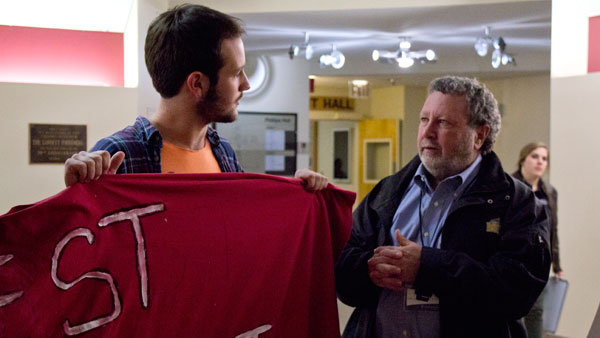About a dozen student representatives from the Environmental Leadership Action Network and Ithaca College Environmental Society stood silently outside the entrance to Emerson Suites on Oct. 23 holding signs and banners. As members of the Ithaca College Board of Trustees arrived for a dinner in Emerson Suites, the protesters stood outside hoping to voice their opinions on the college divesting from the fossil-fuel industry.
The divestment campaign requests money from the college’s endowment, which includes donations and investments, that is currently invested in unsustainable energy corporations be invested elsewhere. The profit made on the investments is returned to the college and then used for reducing tuition and funding scholarships, among other financial support. The student organizations’ campaign joins in solidarity with other colleges in the national divestment campaign.
Senior Jeremy Betterley, co-president of ICES, said he thinks the national campaign can make an impact on the way the fossil-fuel industry operates simply by taking investments out of those companies.
“If all the colleges in the nation take their money out of fossil-fuel industries, it would depress the shareholder value of companies like Exxon and Shell, who are creating huge problems around the world,” Betterley said. “That would spark a lot of positive change to the environment.”
The action was intended to be a silent protest where students would line the entrance to Emerson Suites and encourage conversation with members of the Board of Trustees and others invited to the dinner. Senior Abby Togliatti said the purpose of the silent protest was to educate.
“By having this action today, we really want to let the Board of Trustee members know that they should care about divestment as much as we do,” Togliatti said. “It’s something we should be all invested in.”
John Sadwith ’72, who was attending the Board of Trustees dinner, joined in with the students for a few minutes and held a banner with them. He said he was involved in the divestment movement when he was in college, but at the time it was not a big deal, so no one heard their voices. Sadwith encouraged the students to continue because he said people are listening to them.
“You guys need like, a bull horn and drums or something,” Sadwith said to the protestors. “You’ve got to get attention.”
Last spring, ICES and ELAN asked to be on the agenda to present to the entire Board of Trustees at their meeting this fall. They were denied permission to present to the entire board, Togliatti said.
The students protesting presented to Thomas Grape, chair of the Board of Trustees; Chris Lacroix, chair of the Board of Trustees’ Investment Committee; and Nancy Pringle, vice president and general counsel, about their initiatives on Oct. 24.
Jessie Braverman, a member of ELAN, said the presentation educated the administrative representatives about the need for the college to divest and reinvest elsewhere and to be clear about the organization’s demands to fully divest from the fossil-fuel industry. She said seven other colleges and universities, like Unity College in Maine and Hampshire College in Massachusetts, have committed to fully divesting.
“They seem really excited about it and pretty receptive with the information we shared with them,” Braverman said. “At the end of the meeting, they thanked us for all of our passion and excitement about what we’re doing and our commitment to it.”
Grape said he and Lacroix were interested in hearing what the students had to say, and they are going to take their views under advisement.
Braverman said the group made two requests: one, to send one member of the Board of Trustees to a conference about divestment, which will occur next year; and two, creating a socially responsible investment committee, most likely comprised of three members of the Board of Trustees, three students, three faculty members and possibly members of the administration including President Tom Rochon.
“It would give a space for students and faculty and administration members to talk about where we are investing our money,” Braverman said.
Sophomore Erika Bucior said the feedback was significantly different from the stories she heard about last year’s protest. Previously, she said, the Board of Trustees did not respond or actively listen to the students’ requests. This year, however, some dinner attendees encouraged the students to continue the battle for divestment and were willing to have open conversations with the students.
“It was, overall, a positive experience — better than a lot of us expected,” Bucior said. “It’s a step in the right direction for the future of divestment.”








